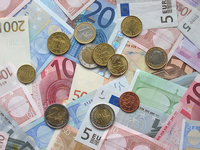That which does not kill us makes us stronger. Perhaps Nietzsche's famous words would be more apt as the European Union's motto, instead of "Unity in Diversity," for in the now half-century of European integration, progress has often been made through crisis. Indeed, political Europe was actually born out of a "crisis": World War II.
If the union's current difficulties are a measure of its future progress, then progress will be great, as the current financial and economic crisis is mercilessly revealing the EU's fundamental weaknesses: its lack of reactivity, its lack of solidarity, its lack of vision. In short, not only does the EU lack power, it lacks willpower. Europe has seemed to be running behind events in each new stage of the crisis, reluctantly offering some partial and fragile solution until the next episode turns it upside down and calls for further action. Europe is not managing this crisis: It is barely catching up with it at every turn.
But perhaps it is outdated to think of crises in Europe as cathartic moments of unity between former intimate enemies trying to build peace through trade. Perhaps, instead, they have become the only way to rule an ever-more-cacophonic union. The EU's system of accidental crisis management could then be seen as a practical mode of governance for countries that, no longer willing to take transparent steps forward together during times of stability and growth, are only able to commit to integration by stealth or turmoil.

